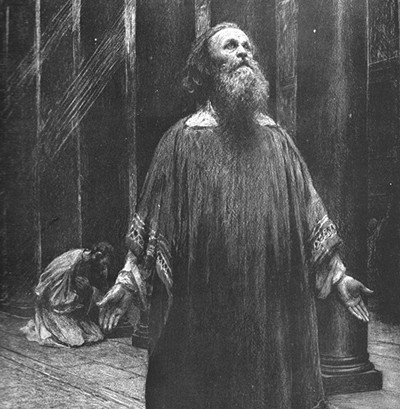For centuries our Church and our cultures have taught us about the "correct" way to approach God (by whatever name He is known). Different societies, ethnic groups and even different religions have come up with "standard" means of practicing prayer, ways of communicating with the transcendent. Men and women throughout history have sought different ways to reach out to God, to "find themselves," to gain nirvana, to get to heaven. Prayer was always considered the first step in the journey.
 Young people often abandon the practices of their elders and older folks sometimes tend to take refuge in the devotions and contemplative activities that their children never knew. Those in between seemed to have given up altogether.
Young people often abandon the practices of their elders and older folks sometimes tend to take refuge in the devotions and contemplative activities that their children never knew. Those in between seemed to have given up altogether.
The Gospel today gives us two examples of prayer. Jesus’ parable should send a signal to people like us who come to church Sunday after Sunday (or even daily), put generous amounts in the collection basket, pledge funds for church building campaigns and diocesan programs and volunteer around the parish and in the community. All this is fine even exemplary. Yet Jesus' parable is still meant for us. We need to check our motives and our attitudes towards self and others because there is a bit of the Pharisee in all of us.
There is a tragic flaw in the Pharisee's prayer. His prayer is about himself and his achievements. The Pharisee seems to love the sound of his own voice praying. He has a rather comfortable life of piety, but his vision doesn't go beyond himself. Indeed, he is looking in the wrong direction. He should be focusing on God.
One of the reasons we pray is to be open to God's voice and stirrings in our heart. Jesus shows where God's heart lies. It is with the repentant tax collector. His focus is on God and not himself, believing God is merciful.
After all of our talk about the experience of prayer, what is really important is that prayer is not something that we do only for ourselves. We do it also for God, not because He needs our attention, but because He wants it.
Attention is the key word here. Prayer is paying attention to the presence of God. It is tending toward the presence of God. It is intending God's presence. It is being tender with God's presence and being able to live with the tension of God's presence. It is living intensely with God's presence.
The Christian understanding of prayer is one where, even though it involves our active participation, it is an event where God has the primary role. He is the Initiator of our prayer, and prayer is always a response to His invitation. In order to respond we first must listen and be attentive to tune in to the power of the Spirit within us already.
God is present to us in the most un-magnificent and most ordinary ways. We must be attentive to that presence, because that presence is elusive and fragile and easily missed. Each of us is different, and we each live different styles of life within the community of faith. What the practice of prayer means for each of us will vary also. It may all look different or take different forms but it will always be the same thing. It will be being attentive to the presence of God in our lives. It will involve being faithful to Him, to ourselves and to one another. It will take perseverance and persistence. It will be both the joy of the mountaintop and the drought of the desert.
Prayer, in this sense, is not so much something we do, but rather a way of seeing and hearing what in fact is already being done.
Image: The Pharisee and the Publican, Eugene Burnand





